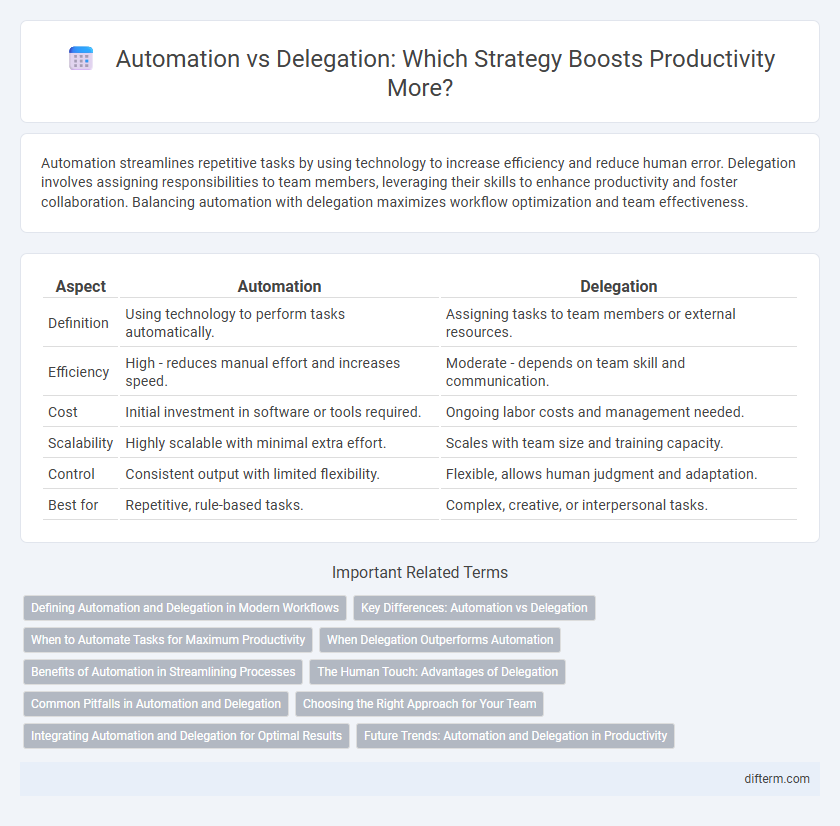Automation streamlines repetitive tasks by using technology to increase efficiency and reduce human error. Delegation involves assigning responsibilities to team members, leveraging their skills to enhance productivity and foster collaboration. Balancing automation with delegation maximizes workflow optimization and team effectiveness.
Table of Comparison
| Aspect | Automation | Delegation |
|---|---|---|
| Definition | Using technology to perform tasks automatically. | Assigning tasks to team members or external resources. |
| Efficiency | High - reduces manual effort and increases speed. | Moderate - depends on team skill and communication. |
| Cost | Initial investment in software or tools required. | Ongoing labor costs and management needed. |
| Scalability | Highly scalable with minimal extra effort. | Scales with team size and training capacity. |
| Control | Consistent output with limited flexibility. | Flexible, allows human judgment and adaptation. |
| Best for | Repetitive, rule-based tasks. | Complex, creative, or interpersonal tasks. |
Defining Automation and Delegation in Modern Workflows
Automation in modern workflows involves using technology and software to perform repetitive tasks with minimal human intervention, enhancing efficiency and consistency. Delegation refers to assigning specific responsibilities to team members based on their skills to optimize resource use and improve productivity. Integrating automation with effective delegation creates a balanced system that maximizes output while allowing human oversight and strategic decision-making.
Key Differences: Automation vs Delegation
Automation utilizes technology to perform repetitive tasks without human intervention, significantly reducing time and errors. Delegation involves assigning responsibilities to team members, leveraging human skills and judgment to complete complex or creative work. While automation excels in efficiency and consistency, delegation enhances collaboration and decision-making within productivity workflows.
When to Automate Tasks for Maximum Productivity
Automate repetitive, rule-based tasks to free up time for strategic work that requires human judgment and creativity. Prioritize automation for processes with high volume and low variability to reduce errors and increase efficiency. Delegation remains essential for tasks needing interpersonal skills, nuanced decision-making, and adaptability beyond automation's capabilities.
When Delegation Outperforms Automation
Delegation outperforms automation when tasks require critical thinking, creativity, or nuanced communication that machines cannot replicate effectively. Human judgment ensures adaptability and empathy in complex problem-solving or relationship-based activities, maintaining quality and trust. Tasks involving unpredictable variables or requiring ethical considerations benefit significantly from skilled delegation over rigid automation.
Benefits of Automation in Streamlining Processes
Automation enhances productivity by executing repetitive tasks with speed and accuracy, reducing the likelihood of human error. Integrating AI-powered tools and software systems streamlines workflows, enabling real-time data processing and consistent output quality. This leads to significant time savings and allows teams to focus on strategic, high-value activities.
The Human Touch: Advantages of Delegation
Delegation leverages the human touch by fostering collaboration, enhancing team skills, and enabling personalized problem-solving that automation cannot replicate. It builds trust and accountability, empowering employees to take ownership and contribute creatively to projects. These advantages make delegation a vital strategy for sustainable productivity improvements in dynamic work environments.
Common Pitfalls in Automation and Delegation
Common pitfalls in automation include over-reliance on rigid systems that fail to adapt to nuanced tasks, resulting in errors and decreased efficiency. Delegation risks arise from unclear communication and lack of proper training, leading to misunderstandings and inconsistent outcomes. Balanced integration of tailored automation tools and empowered delegation enhances overall productivity by minimizing these typical challenges.
Choosing the Right Approach for Your Team
Selecting between automation and delegation depends on task complexity and team skill sets; automation excels in repetitive, rule-based processes while delegation leverages human judgment for nuanced tasks. Evaluating workflow bottlenecks and individual strengths ensures optimal productivity by aligning technology with employee capabilities. Balancing these approaches maximizes efficiency and fosters professional growth within the team.
Integrating Automation and Delegation for Optimal Results
Integrating automation and delegation maximizes productivity by streamlining repetitive tasks through technology while leveraging human skills for complex decision-making. Automation tools handle routine processes such as data entry and scheduling, freeing team members to focus on strategic initiatives and creative problem-solving. Combining these approaches ensures efficiency and empowers employees, driving optimal business outcomes.
Future Trends: Automation and Delegation in Productivity
Future trends in productivity emphasize the integration of advanced automation technologies such as AI-driven software and robotic process automation, which streamline repetitive tasks and enhance efficiency. Delegation evolves through intelligent task management systems that optimize workforce allocation by analyzing skills and availability in real-time. Combining automation with strategic delegation maximizes productivity by balancing human creativity with machine precision.
automation vs delegation Infographic

 difterm.com
difterm.com